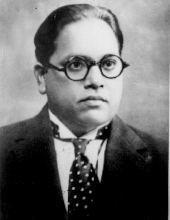Post-secondary education
In1897, Ambedkar's family moved to Mumbai where Ambedkar became the only untouchable enrolled at
Elphinstone High School. In 1906, when he was about 15 years old, his marriage to a nine-year-old girl, Ramabai, was
arranged.
[1]
Undergraduate studies at the University of Bombay
In 1907, he passed his matriculation examination and in the following year he entered
Elphinstone College, which was affiliated to the
University of Bombay, becoming the first untouchable to do so. In his book,
The Buddha and his Dhamma, that when he passed his English fourth standard examinations, the people of his community wanted to celebrate because they considerd that he had reached "
great heights" which he says was "
hardly an occasion compared to the state of education in other communities". A public ceremony was evoked, to celebrate his success, by the community, and it was at this occasion that he was presented with a biography of the Buddha by Dada Keluskar, the author and a family friend.
By 1912, he obtained his degree in economics and political science from Bombay University, and prepared to take up employment with the Baroda state government. His wife had just moved his young family and started work when he had to quickly return to Mumbai to see his ailing father, who died on 2 February 1913.
Postgraduate studies at Columbia University
In 1913, Ambedkar moved to the United States at the age of 22. He had been awarded a Baroda State Scholarship of £11.50 (Sterling) per month for three years under a scheme established by
Sayajirao Gaekwad III (
Gaekwad of
Baroda) that was designed to provide opportunities for postgraduate education at
Columbia University in
New York City. Soon after arriving there he settled in rooms at
Livingston Hall with Naval Bhathena, a
Parsi who was to be a lifelong friend. He passed his M.A. exam in June 1915, majoring in Economics, and other subjects of Sociology, History, Philosophy and Anthropology. He presented a thesis,
Ancient Indian Commerce. Ambedkar was influenced by
John Dewey and his work on democracy.
Postgraduate studies at the London School of Economics

Ambedkar (In center line, first from right) with his professors and friends from the London School of Economics (1916-17)
In October 1916, he enrolled for the
Bar course at
Gray's Inn, and at the same time enrolled at the London School of Economics where he started working on a doctoral thesis. In June 1917, he returned to India because his scholarship from Baroda ended. His book collection was dispatched on different ship from the one he was on, and that ship was torpedoed and sunk by a German submarine.He got permission to return to London to submit his thesis within four years. He returned at the first opportunity, and completed a master's degree in 1921. His thesis was on "The problem of the rupee: Its origin and its solution". In 1923, he completed a D.Sc. in Economics, and the same year he was called to the Bar by Gray's Inn. His third and fourth Doctorates (LL.D, Columbia, 1952 and D.Litt., Osmania, 1953) were conferred
honoris causa.


Comments
Post a Comment